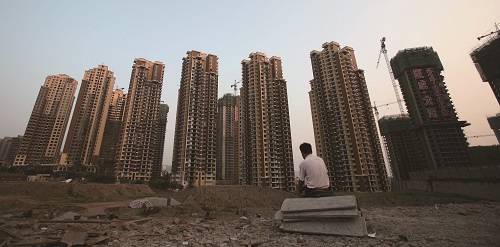What Happened to the Hard Landing?
By Michael Dow
 China is heading towards an economic, political and social meltdown at "some time within the next six months", author Gordon Chang wholeheartedly reiterated in June 2013. This timeframe has long passed and alas, China's economy and political system still haven't collapsed. There were a number of worrying trends emerging within the Chinese economy last year that gave us food for thought and even the most intelligent economists in the world make predictions that don't come true. Even more embarrassingly for Mr Chang, this isn't his first doomsday prophecy that didn't come true. The lawyer-turned television pundit began his career as a tout for China's upcoming socioeconomic Armageddon when he released his now prolific book The Coming Collapse of China in 2001. In his defining work he famously made the prediction that "The end of the modern Chinese state is near. The People's Republic has five years, perhaps ten, before it falls". Despite the fact that China has gone from strength to strength since then, Chang continues to assert that the Chinese economy and the country's government will disintegrate "any time now".
China is heading towards an economic, political and social meltdown at "some time within the next six months", author Gordon Chang wholeheartedly reiterated in June 2013. This timeframe has long passed and alas, China's economy and political system still haven't collapsed. There were a number of worrying trends emerging within the Chinese economy last year that gave us food for thought and even the most intelligent economists in the world make predictions that don't come true. Even more embarrassingly for Mr Chang, this isn't his first doomsday prophecy that didn't come true. The lawyer-turned television pundit began his career as a tout for China's upcoming socioeconomic Armageddon when he released his now prolific book The Coming Collapse of China in 2001. In his defining work he famously made the prediction that "The end of the modern Chinese state is near. The People's Republic has five years, perhaps ten, before it falls". Despite the fact that China has gone from strength to strength since then, Chang continues to assert that the Chinese economy and the country's government will disintegrate "any time now".
Since its publication thirteen years ago, The Coming Collapse of China has been pretty well received and its author is still being invited to make special guest appearances as a leading 'China expert' on primetime news shows, televised debates and all kinds of media platforms. Not only has this doom-mongering undoubtedly made Gordon Chang a handsome living and tremendous amount of notoriety, it has also paved the way for other financial commentators and writers who have jumped on the China collapse bandwagon. This group of prolific pessimists includes respected economic thinkers like James Chanos, Harry Dent and Marc Faber. Like Chang, these commentators largely base their arguments on the unstable nature of China's economic and financial systems. They assert that huge underlying problems in the property markets, bad loans, cheap credit and a badly managed financial system are leading to a multiplicity of dangerous bubbles that will burst dramatically in the near future.
 In terms of making outlandish doomsday predictions that haven't materialized, Gordon Chang could give Nostradamus and the person who wrote the infamous apocalyptic Mayan Calendar a good run for their money. There is certainly some merit to the arguments that Chinese real estate is overvalued and that the credit situation needs to be brought under control, but the transition from a flawed economy in need of correction to a complete meltdown of the entire system is not very likely to play out any time soon. It's not that these bubbles won't burst-they most certainly will. Mainland Chinese stocks have, for the most part, stayed in bear market territory since the big correction in early 2013. In 2014 we've also seen a slowdown in GDP growth, a significant depreciation of the renminbi, a tightening of credit and a cooling off in China's gravity-defying property markets. This would all seem to paint a very bleak picture of China's future economic prospects, unless, of course, it was all actually part of a deliberate plan by the central government to make China's economic growth more balanced and sustainable.
In terms of making outlandish doomsday predictions that haven't materialized, Gordon Chang could give Nostradamus and the person who wrote the infamous apocalyptic Mayan Calendar a good run for their money. There is certainly some merit to the arguments that Chinese real estate is overvalued and that the credit situation needs to be brought under control, but the transition from a flawed economy in need of correction to a complete meltdown of the entire system is not very likely to play out any time soon. It's not that these bubbles won't burst-they most certainly will. Mainland Chinese stocks have, for the most part, stayed in bear market territory since the big correction in early 2013. In 2014 we've also seen a slowdown in GDP growth, a significant depreciation of the renminbi, a tightening of credit and a cooling off in China's gravity-defying property markets. This would all seem to paint a very bleak picture of China's future economic prospects, unless, of course, it was all actually part of a deliberate plan by the central government to make China's economic growth more balanced and sustainable.
When people talk about economic collapses, wars, energy crises, hyperinflation and many other catastrophic events, they often fall into the trap of assuming that these disasters are inevitable and that we're powerless to do anything about them. One of big advantages Chinese policymakers have is that they can learn from the mistakes that were made by Western governments and central bankers before and after the financial crisis of 2007-08. We now know that reckless policy mistakes made by the George W. Bush administration and the Federal Reserve allowed bad lending practices in the U.S. subprime mortgage sector to derail the entire global economy. It is also clear from the examples of Greece, Ireland, Portugal and a number of other European countries that high levels of public debt can be devastating. Although China's policymakers are not infallible and omniscient paragons of divine competence, unlike many of their Western counterparts, they do seem to know a dangerous asset bubble when they see one. Therefore, if property prices, bad debts or any other kind of financial problem was threatening to destroy the country's entire economic and political system, it is very hard to see how any rationally-minded person could envisage them standing back and doing nothing about it.
 Indeed this is exactly the opposite of what is happening today. As the former Chairman of Morgan Stanley Asia, Stephen Roach, has pointed out, "China has had its fair share of bubbles over the years and they are in the process of popping this one right now through very aggressive measures". Last year we saw a slowdown in real estate prices throughout China, which indicates that the new legislation is producing the intended consequences. Going forward we are also likely to see a more stable environment amongst many other asset classes. Although the bubbles have been good for some Chinese people, a few corrections here and there wouldn't be a bad thing for the long term stability of the economy and therefore a steadier appreciation of assets should be in their best interests.
Indeed this is exactly the opposite of what is happening today. As the former Chairman of Morgan Stanley Asia, Stephen Roach, has pointed out, "China has had its fair share of bubbles over the years and they are in the process of popping this one right now through very aggressive measures". Last year we saw a slowdown in real estate prices throughout China, which indicates that the new legislation is producing the intended consequences. Going forward we are also likely to see a more stable environment amongst many other asset classes. Although the bubbles have been good for some Chinese people, a few corrections here and there wouldn't be a bad thing for the long term stability of the economy and therefore a steadier appreciation of assets should be in their best interests.
A consequence of this deliberate slowdown has been a slowing of annual GDP growth. It never ceases to amaze me when people say things along the lines of "the Chinese economy is only going to grow at 7.5% this year, and they might only see 7% growth in 2015". Given that Western economies are battling severe debt problems, incredibly high levels of youth unemployment and are finding it difficult to achieve 2% consistent GDP growth per year, the media hysteria over the Chinese economy only growing by 7.5% in 2014 is beyond ridiculous. Sure, the current figures are a far cry from the double digit growth China experienced at the start of the century, but it is still a phenomenal increase in wealth and prosperity that is unimaginable for people in Europe or North America.
If China's GDP growth slows down to 5 or 6% in the coming years, as most economists predict, then this will no doubt add some much needed fuel to the hard landing thesis. However, we have to remember that if Chinese policymakers are going to address the inequalities and imbalances in society, then they need to focus more on the quality of growth, as opposed to the quantity. At the end of the day, if China's GDP only grows by 5% per year, but that growth is more sustainable, eco-friendly and evenly distributed then it would be far better for the Chinese people and the global economy as a whole.
---END---